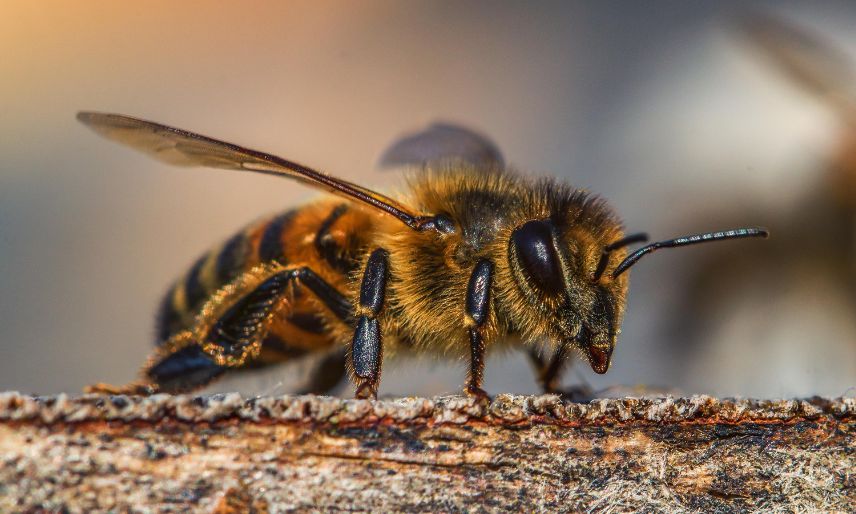
Understanding Honey Bees: Their Behavior and the Importance of Honey Bee Control Services
Honey Bee Control Services: Managing Infestations and Preserving a Vital Species Honey bees, renowned for their honey production and plant pollination abilities, are social insects that live in colonies or hives. They play a crucial role in the ecosystem. However, there are situations where honey bee infestations can pose challenges, necessitating the need for control services. Recognizable by their yellow and black striped bodies and clear wings, honey bees are typically smaller than other bee species like bumblebees. They are active during the day and thrive in warm and sunny weather conditions. Honey bees form colonies or hives consisting of thousands of individual bees. The colony is led by a queen bee responsible for reproduction and egg-laying. Other bees within the colony have distinct roles such as foraging for food, nurturing the young, and defending the hive.
Honey bees are renowned for their honey production, a sweet and sticky substance used as their food source. Additionally, they are vital for pollination, a process essential for the reproduction and survival of numerous plant species. However, in certain circumstances, honey bee infestations can become problematic. They may establish hives in unwanted areas such as buildings, trees, or structures, becoming a nuisance. Furthermore, honey bees can exhibit aggression if they perceive a threat, posing risks to humans. In such cases, honey bee control services become necessary to safely remove the bees and prevent their return. These services typically involve hive and bee removal, as well as preventive measures. It is crucial to engage professional pest control companies experienced in dealing with honey bees for these services.
It is important to acknowledge that honey bees are not only important for the environment but are also facing population decline due to human activities, pesticides, and climate change. Minimizing the use of pesticides and chemicals is crucial. Instead, efforts should focus on creating an environment that supports the thriving of honey bees. In conclusion, honey bees are vital insects contributing to the ecosystem through honey production and plant pollination. While infestations can be problematic in specific situations, control services offer solutions for their safe removal. It is crucial to remember their significance and take measures to protect and preserve these essential pollinators.
Exploring Ant Diversity and Behavioral Patterns: A Guide to Different Ant Species
Honey bees occupy a crucial position in both agriculture and the environment. As primary pollinators, they facilitate the fertilization process by transferring pollen from the male to the female parts of flowers. This vital role enables plants to produce a diverse range of fruits, vegetables, and seeds. The impact of honey bees on agriculture cannot be overstated. Approximately one-third of the world's food crops, including fruits, vegetables, nuts, and seeds, rely on honey bee pollination. Additionally, they contribute to the pollination of plants used as forage for livestock. Consequently, honey bees are indispensable for global food production, benefiting both humans and animals alike.
Beyond agriculture, honey bees have a profound positive influence on the environment. Through their pollination activities, they foster biodiversity by pollinating a wide array of plants. This intricate web of pollination supports the entire ecosystem, providing food and habitats for various insects, birds, and animals. Unfortunately, honey bee populations have experienced a decline in recent years, primarily due to factors like habitat loss, pesticide exposure, and disease. This decline has significant ramifications for agriculture and the environment, leading to reduced crop yields and a decrease in biodiversity.
To safeguard honey bees and their habitats, it is imperative to take protective measures. Reducing the use of pesticides, creating bee-friendly habitats, and adopting sustainable farming practices are crucial steps in ensuring their well-being. Moreover, professional honey bee control services play a pivotal role in protecting these vital pollinators through the implementation of humane and safe methods for bee removal and control.
Effective Techniques Employed by Professionals for Honey Bee Removal and Control
- Live bee removal: This method involves safely removing honey bees from the infested area without causing harm. The bees are carefully captured and relocated to a more suitable location, allowing them to continue their important role in pollination and honey production.
- Trapping:Professionals may employ specialized traps to capture honey bees. These traps utilize attractants or pheromones to lure the bees, enabling their safe removal and relocation.
- Cut-out: In situations where honey bees have established their hive in inaccessible areas such as walls or roofs, the cut-out method may be employed. This involves carefully cutting open the structure to access the hive and remove the bees. Although more invasive, it is considered highly effective in eliminating the infestation.
- Chemical treatments (last resort): Chemical treatments should be used sparingly and as a last resort. If other methods are not feasible, professionals may utilize targeted chemical treatments to control honey bee infestations. However, this approach is generally avoided to minimize harm to the bees and the environment.
- Smoke:Smoke is commonly used to calm honey bees during removal procedures. By masking the alarm pheromones released by agitated bees, smoke reduces their defensive behavior, making it easier and safer to remove them.
- Pheromone-based traps:Pheromone-based traps are designed to attract honey bees using specific pheromones. Once lured into the traps, the bees are captured and subsequently removed.

